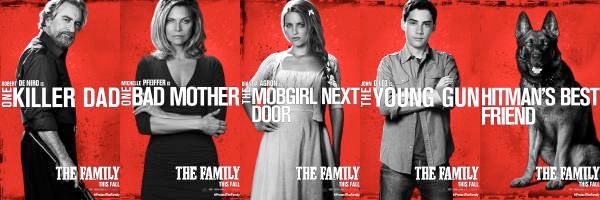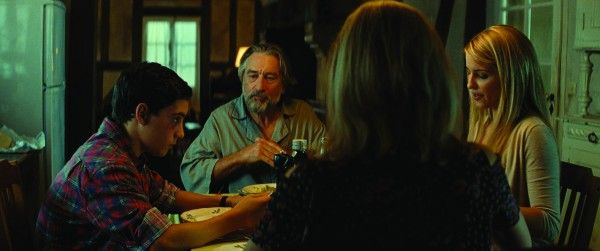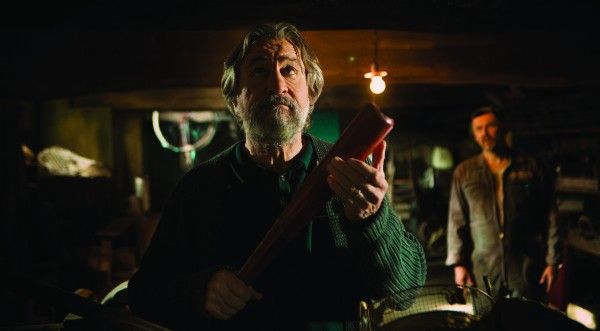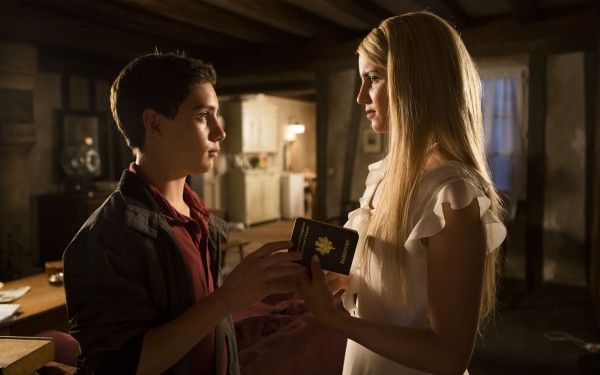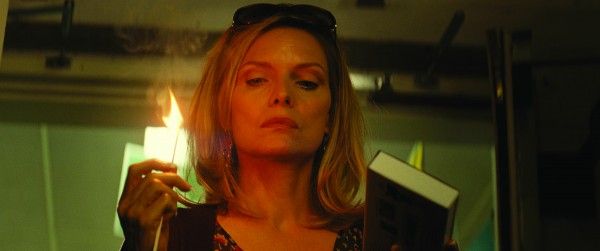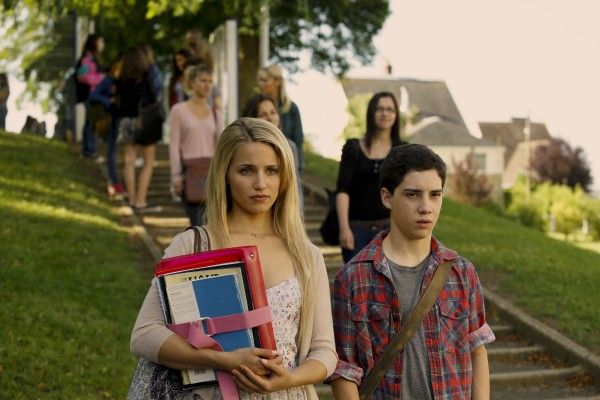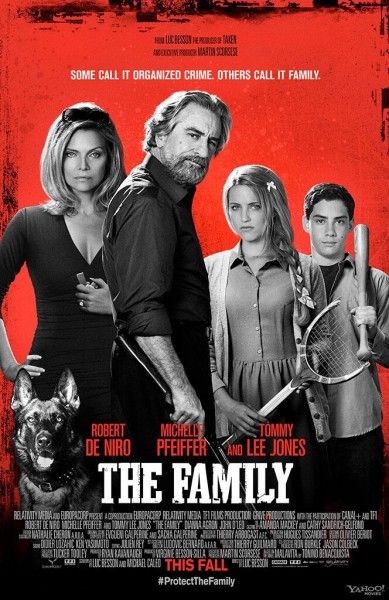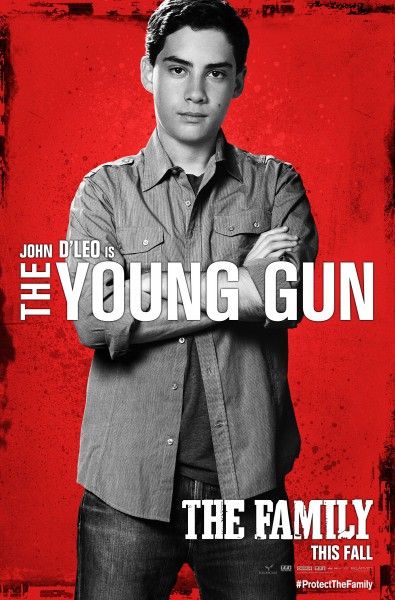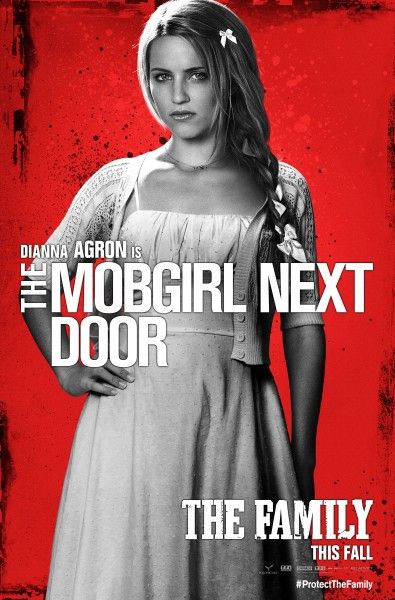In the new film The Family, (opening in theaters Friday, September 13th) director and screenwriter Luc Bresson brings to life a familiar family of mobsters and places them in witness protection in the middle of France. Giovanni (Robert De Niro), his wife Maggie (Michelle Pfeiffer) and two kids know they should be keeping a low profile but they can’t seem to forget their previous lives, resorting to much more violence than it seems would go so unnoticed. The film packs some funny moments, particularly from Pfeiffer. The Family also stars Glee’s Dianna Agron and John D’Leo as the family’s ruthlessly brilliant children.
At the recent press conference for the film, a select group of reporters was able to ask questions of the impressive cast. The young stars of course discussed the impact of working with two legends of the industry, and the veteran actors commended their young partners on their fresh perspective. Pfeiffer and De Niro mentioned that they were thrilled to finally have scenes together, after starring in two films (Stardust and New Year’s Eve) that never let them appear onscreen at the same time. De Niro talked about rewatching Goodfellas to prepare for the film (his gangster character watches it and has to critique the truthfulness of it without revealing his cover). Click after the jump to read the entire press conference.
Though not all of the questions at the press conference were particularly insightful, some got the surprisingly reticent De Niro and others to open up. Highlights included De Niro’s recollection of preparing for the film by watching Goodfellas, “I rewatched it and looked at the DVD and there was a lot of stuff I had not seen, interviews with Henry Hill and other characters. And I wanted to just make sure cause we were doing the last part of it, the Cinemateque thing, I wanted to make sure I had everything covered and all kinds of stuff. I wanted to make sure I spoke to Nick Pileggi a few times, I had to talk to Luc just about that monologue, I wanted to make sure it was accurate.” He also had a quick word about pal Martin Scorcese, when he was asked what Scorcese would think of De Niro’s character’s interpretation of the film. “Marty told me he liked the movie, he told me he liked it a lot. I don’t know if he saw it with an audience or not but I know him well enough to know he was telling me the truth.”
Perhaps the most interesting part of the press conference was when the cast spoke about working with each other, particularly Pfeiffer and De Niro. Pfeiffer said about her legendary costar, “look, it was a dream come true working with him. [To De Niro] Sorry to embarrass you. But as an actor it really doesn’t get any better than that, working with De Niro. And third time was the time, it took three movies to finally be onscreen with him but it finally happened, and I just didn’t know what to expect really, we had only met on the red carpet saying ‘cheese’ opening two films. And he was just delightful, in every sense of the word. I was really so relieved to see how generous he was with all of us as actors, and giving and open and it was just great. Our only regret was that we didn’t have more scenes together.” To which De Niro replied, “Yep.”
When De Niro was asked if he knows what a reference he is, he remained humble. “I don’t think much about it. I mean I’m sometimes aware of it, people say things.” And D’Leo put it best when he candidly said, “yeah, he’s good. [Laughs]. That about sums it up.”
My personal favorite moment of the entire event was when De Niro was asked if he planned to slow down. To which De Niro said, “What am I gonna do? Die?”
The entire press conference is transcribed below:
Question: What do you think are the basic elements that turn an action comedy into a classic and what do you think is so appealing about dark themes?
Robert De Niro: Dark themes connected to comedies? Well everybody’s always interested in a dark theme but there’s humor connected to it and that seems that that helps, if it’s really an integral part of the whole thing. An organic part of it, if you will.
Dianna Agron: I think escapism. I don’t know about you guys but I’m sure that almost anybody will say they relate to the themes of this movie. You go to the movies to laugh, you go to the movies to see things that you don’t normally see in your life and I don’t know. I think it’s definitely that kind of thing.
John D’Leo: I think this film has a lot of different elements like Dianna said and to be put all in one package, I think the audience is really gonna like it.
Michelle Pfeiffer: Well, it’s what’s taboo, it becomes titillating, it becomes that part of you that… in civilized societies we spend our lifetimes trying to become what is socially acceptable and we’re dark and we’re light, we all have both sides to us. And I think it’s sort of living vicariously through these characters onscreen. And it’s that thing that, especially in this type of film, where you’re horrified and you’re laughing at the same time and you are like ashamed that you’re actually laughing at this horror in front of you. But it’s also what makes it so unexpected. So it’s ultimately entertaining.
Question: And what do you think makes an action comedy into a classic, like Analyze This?
De Niro: I think the human part of it has to be important, like this, The Family, there has to be some grounding in reality. Not that you can’t go off in certain directions, but even that has to be grounded ideally.
Pfeiffer: I think it’s covering new territory that hasn’t been covered before, and it’s good story. And I think those two elements, whatever genre it is, the film will become a classic.
Question: Michelle you did a great mafia comedy a few years ago called Married to the Mob. Do you see any connections between that wonderful character then and the wonderful woman you’re playing here, who’s so protective of her family?
Pfeiffer: I think that it’s really the story of motherhood, whether you’re a mob wife or you’re somebody from Orange County or you know, somebody in Europe. It’s sort of the mother-protector really. The only real connection between the two characters is that they both are married to mobsters but there’s a wide variety of those women too. In some way, I was really excited to do this because I loved working on Married To The Mob for so many reasons, the biggest one being Jonathan Demme and he is just, I love, love that character. And this is really the first opportunity for me to enter back into that world and so I was just thrilled and delighted and a little bit nervous that people were going to make comparisons but I think ultimately the characters are pretty different.
Question: Dianna you took some time off of Glee to film this movie, what was it like returning back to that family of yours after this wonderful experience?
Agron: Right, luckily we are a family and it’s unique because on a TV show you get to spend so much more time with people, so yeah everybody was so supportive of me going off and doing this. We’ve been through almost everything together so it’s a testament to that.
Question: All of you and Martin Scorcese and Bresson are a kind of Hollywood family. Can we assume that Hollywood has it’s own mafia and is it good for the movie business?
De Niro: Well it has it’s groups that work together, hang together. Like any profession, the same thing, any business, any community, creative community. People work together, certain groups.
Pfeiffer: They beat each other up.
Question: Did you rewatch Goodfellas before this and how did you feel about that?
De Niro: I did, I rewatched it and looked at the DVD and there was a lot of stuff I had not seen, interviews with Henry Hill and other characters. And I wanted to just make sure cause we were doing the last part of it, the Cinemateque thing, I wanted to make sure I had everything covered and all kinds of stuff. I wanted to make sure I spoke to Nick Pileggi a few times, I had to talk to Luc just about that monologue, I wanted to make sure it was accurate.
Question: But that was actually in the book, the Goodfellas scene [where De Niro’s character watches Goodfellas].
De Niro: It was but there a monologue about going back to the neighborhood and stuff, it was not connected to what Goodfellas was and not to the neighborhood, there were some specifics they wanted there that had to be fixed. And just to look at the whole movie and the interviews with people to refresh my mind about what went on.
Question: Michelle, you said one of your favorite lines you ever said was from Scarface, where you said “I can’t stop saying “f” all the time”, and in this one you chastise John for swearing. How do you feel about swearing in real life?
Pfeiffer: Yes.
Question: For Mr. De Niro, what do you think Mr. Scorcese’s opinion would have been on [your character] Giovanni’s take on Goodfellas?
De Niro: I don’t know. Marty told me he liked the movie, he told me he liked it a lot. I don’t know if he saw it with an audience or not but I know him well enough to know he was telling me the truth.
Question: Michelle, the chemistry between you and Giovanni was there even in the face of all you went through, what kept that chemistry alive and how was your chemistry with Robert, your onscreen husband?
Pfeiffer: Ooh! [squeezes De Niro’s face.] Look, it was a dream come true working with him. [To De Niro] Sorry to embarrass you. But as an actor it really doesn’t get any better than that, working with De Niro. And third time was the time, it took three movies to finally be onscreen with him but it finally happened, and I just didn’t know what to expect really, we had only met on the red carpet saying ‘cheese’ opening two films. And he was just delightful, in every sense of the word. I was really so relieved to see how generous he was with all of us as actors, and giving and open and it was just great. Our only regret was that we didn’t have more scenes together.
De Niro: Yep.
Question: We see so much of this character from The Family, we see elements of your violent characters from the past we all love so well, as well as the patriarchal family man we see more recently. What we get is a unique combination that we haven’t seen yet. Can you just shed some light on what draws you to the patriarchal character now that you’re moving—
De Niro: -- More patriarchal? No, I, Luc Bresson approached me and sent the book and the screenplay and we talked about it. He was just going to produce it after he wrote the screenplay, but then we found, the way I saw it was that it was harder to get a director that could really interpret the way that he saw it. And so he said let me, I’ll do it myself and I was very happy because it made everything a lot simpler. It was his vision, he started the whole thing. Not that he couldn’t have had a good handle on it as a hands-on producer but it’s tricky. And then Michelle came onboard, then Dianna and John, so I don’t know if that’s answering your question. So anyway the patriarchal character, yes.
Question: Mr. De Niro, do you plan to slow down?
De Niro: What am I gonna do? Die?
Question: Do you think at all about the fact that you’re a huge reference for young actors?
De Niro: No, I don’t think much about it. I mean I’m sometimes aware of it, people say things. But no, I enjoy myself, I don’t really do as many movies as you think, the movies are spread out more.
Question: John, is he a reference for young actors?
De Niro: Well he certainly has the resume to prove it I think, everyone agrees on that. Yeah, he’s good. [Laughs]. That about sums it up.
Question: Dianna in the movie you play a character that in the beginning is established as physically strong very quickly, but as the movie goes on, we find out that she also is emotionally vulnerable. I was wondering if you could talk about that.
Agron: Right. Well, one of the things that I love so much is yeah, that she’s the consummate dreamer, she doesn’t really want anything to do with the habits that her family perpetuates. But she wants to fall in love, she wants the fairy tale, maybe she watched a lot of Disney movies, who knows? That’s when she flips on a dime, it’s because that’s what she knows how to do. So I just love the duality to her, and who doesn’t want to fake beat people up for a job? That’s ridiculous.
Question: If you had to flee in a hurry, what’s the one thing you’d never leave behind?
Agron: My dog.
D’Leo: My real family, that’s pretty important.
De Niro: Same answer. Real family.
Pfeiffer: Yeah, living things, animals, children. That sort of thing. Not in that order.
Question: Any similarities between your families and the family?
D’Leo: Pasta.
Agron: Unconditional love, that you would do anything. I think they would do anything for each other, I would do anything for my family.
Pfeiffer: Yeah, I think that bond, prioritizing family, and I do have one daughter and one son.
De Niro: Yeah, we also have a lot of experience, Michelle and I, with family, relationships, marriage and so that we were able to move into this relationship easily, especially with Luc’s writing he made it easy.
Question: Dianna and John, you worked with two icons of film. What did you pick up from them in your time on set? And Robert and Michelle what did you learn from them during this experience?
Agron: Well I’ve seen probably almost everything that these two have done and same with Luc, really. So you have that going into it, you see these images and these characters that they’ve played and obviously it’s what you can aspire to be. Obviously it’s very mind-blowing when I stop to think about it. But I think that that was my biggest learning curve, looking at all the strokes they’ve been painting on this canvas and seeing what they do with these characters. It was so much more than just being there in the moment, it was thinking about everything and how much I look up to them. It’s so weird because you guys are here. [Laughs]
D’Leo: I think it was really fun to witness them professionally on set because I felt that it helped me a lot as an actor just to, they lead by a very good example and it made my time on set a lot more enjoyable.
Pfeiffer: These two young’uns had been filming for a couple of weeks when we came onboard so they had already found their rhythm and their groove and when you come in late on that it’s a little intimidating. And their work was just already at such a level that frankly I was a little intimidated. And there’s a freshness and I think when you do anything for a long time, you have to make a conscious effort to keep it fresh and not fall into bad habits and not rely on old bags of tricks. I was really reminded to not do that with all of them. John was my dialect coach, because I have a dialect coach but he wasn’t on set, so my dialect is really from where you are from.
D’Leo: From Joisey. I made sure she talked like she was from New Joisey and Staten Island.
Pfeiffer: So it’s always invigorating and rejuvenating to work with young blood.
De Niro: They were great, John and Dianna. They were just terrific. That’s all I can say. We had a good time.
Question: Is there some truth to the witness protection program and what you all went through? Are there really people who were in the mob who could be living next door to us?
D’Leo: We’re not allowed to tell you.
Agron: We would have to kill you.
Question: Could they be in France? Did they put people outside the United States?
De Niro: Well that was a big question I had, and I asked some people here who do that, put people in witness protection. They said not likely, but then Luc said he spoke to people in France that they do, there was some truth to it. My feeling is that there has to be some way that it’s possible, under some strange deal or condition it could happen, anything is possible. So I bought it, as far as that. There was a thing that was set up that the only compromise between the two governments would be putting our family over there. As opposed to anywhere else. So some illegal drugs or something with France, who knows, but there was some way.
Question: If you had to come up with a backstory for yourself like the witness protection program does, what would it be and why?
D’Leo: Chuck Finley and I’m an Abercrombie model.
Question: What about an autobiography? [De Niro’s character] is writing an autobiography. Yours might not be finished yet, yours probably hasn’t even started. But if you were writing one what would you want to call it? Would you do it?
Pfeiffer: No. [Laughs]. It would be titled ‘There but for the grace of God.’
De Niro: Ditto.
Question: How is the movie going to change the image of Americans in popular culture?
D’Leo: It’s going to show Americans back each other up, especially family, and you don’t mess with them. Especially if one has a tennis racket. Or a lead pipe. Or I could go on…
Question: How about your favorite scene? Each one of you, what was your favorite one to shoot?
D’Leo: That’s a very hard question.
Pfeiffer: My favorite scene to shoot was probably [looks at De Niro] our scene. The couch scene. What would you call it? The love scene. That scene. I liked doing that scene.
Question: As opposed to blowing up the grocery store?
Pfeiffer: That was fun. Yeah, that I enjoyed. But it was just that scene was so well written and so meaty and it just kind of went to so many different places and had a lot of colors and it was just fun to get to act with him.
De Niro: I felt the same way about that scene and we wished we had more scenes. Also I liked the last scene, the Cinemateque scene. I liked the whole ending, I thought it was so crazy.
Agron: I think some of our dinner scenes because that was when we were all together. Those were definitely some of the ‘pinch me’ moments, you look over here and these two are to your sides, and you’re like ‘that’s weird!’
D’Leo: I think my favorite is towards the end of the film, not during the giant climax scene, but right before that. When me and Dianna run into each other, before we went our separate ways, when I went to the train station and she was going to the church, that scene. Because you saw in both of us that it had really hit the fan. And it was that point where you think to yourself ‘wow this is really going bad, going downhill.’ And then the whole giant climax scene comes and you’re like ‘wow they’re really staying together after that’ and that’s my favorite part.
Question: Dianna have you ever had to exercise any mob-like moves for a man that crossed a barrier?
Agron: No. We were joking, somebody asked me earlier if I get hit on a lot and the answer is no. Although I did have some French men oddly a couple months ago, I was sitting at a sushi restaurant and they wrote on a napkin ‘will you go out with me, yes no maybe?’ By the maybe it said ‘don’t say no.’ Then the friend of the guy gave it to me as they left, like that’s the most aggressive thing, if that’s happening then no tennis rackets needed. So no, not really.
Relativity Media’s The Family opens in theaters on Friday, September 13th.

